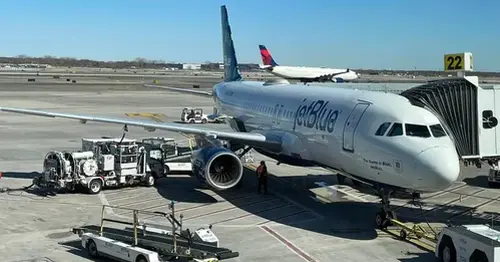
JetBlue plans to cut flights for New York area amid air traffic controller shortage
JetBlue Airways is preparing to cut scores of weekly flights in the New York City area this spring and summer in response to a shortage of air traffic controllers, a measure that will have a financial impact on the airline, CEO Robin Hayes told CNBC on Wednesday.
Last week, the Federal Aviation Administration unveiled a new plan to help avoid a repeat of 2022′s flight disruptions, reducing flight requirements by up to 10% for airlines’ takeoff and landing rights to avoid congestion in the New York City area and Washington, D.C. The FAA cited its staffing shortfall. The waivers will last from May 15 through Sept. 15.
“We don’t want to pull down flights. I’m sure no airline wants to pull down flights,” Hayes said in an interview with CNBC ahead of an event at the Economic Club of New York. “But if we don’t cut them the system is not going to be workable this summer.”
The staffing shortfall and potential schedule cuts in the region highlight the difficulty airlines have faced to ramp up capacity as travel demand returns in the wake of a pandemic lull.
Flight cancellations and delays were elevated during peak parts of 2022, and airlines scaled back schedules then to put more slack in the system. If weather is bad or there are other challenges, disruptions tend to cascade if airlines have packed their schedules with too many flights.
Hayes said the latest measure is particularly impactful for JetBlue, which is based in New York City, because the vast majority of its flights take off from or land in the city or transit its airspace.
“We’re staffed, we’ve already trained pilots, we’re paying for pilots, we’ve bought airplanes, we’re paying for gates and slots,” Hayes said. “This is going to have a very significant financial impact on JetBlue and our customers.”
Delta Air Lines asked the FAA to return up to 10% of the airline’s slots or operating times at the three major airports serving New York City and at Washington Reagan National Airport for the period. United Airlines made a similar request.
Carriers have until April 30 to request the waiver.
“This [air traffic controller] staffing issue has been around for years,” Hayes said. The airline hasn’t yet applied for slot or operating time waivers, but Hayes said the carrier plans to do so and notify customers as soon as possible.
On Wednesday, the FAA held a meeting with airline executives about measures to ease congestion in the New York area. It held similar conversations last year about busy airspace in Florida, and agreed to boost staffing to handle a surge in traffic there.
“Operators requested collaboration and communication with the FAA early and often to plan for circumstances that could result in delays, including weather events, space launches and military operations,” the FAA said in a statement. “They discussed how closer collaboration and frequent air traffic updates would help them more effectively schedule crews.”






